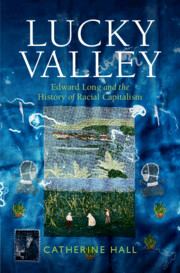Book contents
- Reviews
- Lucky Valley
- Critical Perspectives on Empire
- Lucky Valley
- Copyright page
- Dedication
- Contents
- Colour Plates
- Figures
- Maps
- Acknowledgements
- A Note on Language
- Prologue
- Maps and Family Tree
- Introduction
- Part I Growing up English
- Part II The Lineaments of Racial Capitalism
- Part III Making a Slave Society
- Epilogue
- Bibliography
- Index
- Plate Section (PDF Only)
Epilogue
Published online by Cambridge University Press: 11 January 2024
- Reviews
- Lucky Valley
- Critical Perspectives on Empire
- Lucky Valley
- Copyright page
- Dedication
- Contents
- Colour Plates
- Figures
- Maps
- Acknowledgements
- A Note on Language
- Prologue
- Maps and Family Tree
- Introduction
- Part I Growing up English
- Part II The Lineaments of Racial Capitalism
- Part III Making a Slave Society
- Epilogue
- Bibliography
- Index
- Plate Section (PDF Only)
Summary
Long lived in England, a place which was changing, for more than forty years until his death in 1813. He actively campaigned against black and white abolitionists and for the continuation of the slave trade. Despite making many additions and corrections, he never completed a second edition of the History. He had endeavoured to clinch his argument as to the essential inequality of white and black with a demolition of the free black Jamaican, Francis Williams. Educated in England, Williams was a poet and mathematician, and had established a school for black boys in Spanish Town. He had been cited by Hume in 1753 as providing an example of how ‘Negroes’ could never do more than mimic white Europeans. Williams represented for Long the terrifying spectre of African claims for equality: he claimed legal rights, could write Latin poetry, possessed a library of Enlightenment scholarship, taught his pupils Newtonian principles and dressed like a gentleman. It was essential to undermine him, pouring scorn on all his pretensions. But in so doing, Long demonstrated how his own privileged whiteness rested on sand. Only by denigrating blackness could he maintain his own sense of an entitled self; he needed that ‘otherness’ to know himself.
- Type
- Chapter
- Information
- Lucky ValleyEdward Long and the History of Racial Capitalism, pp. 416 - 445Publisher: Cambridge University PressPrint publication year: 2024

